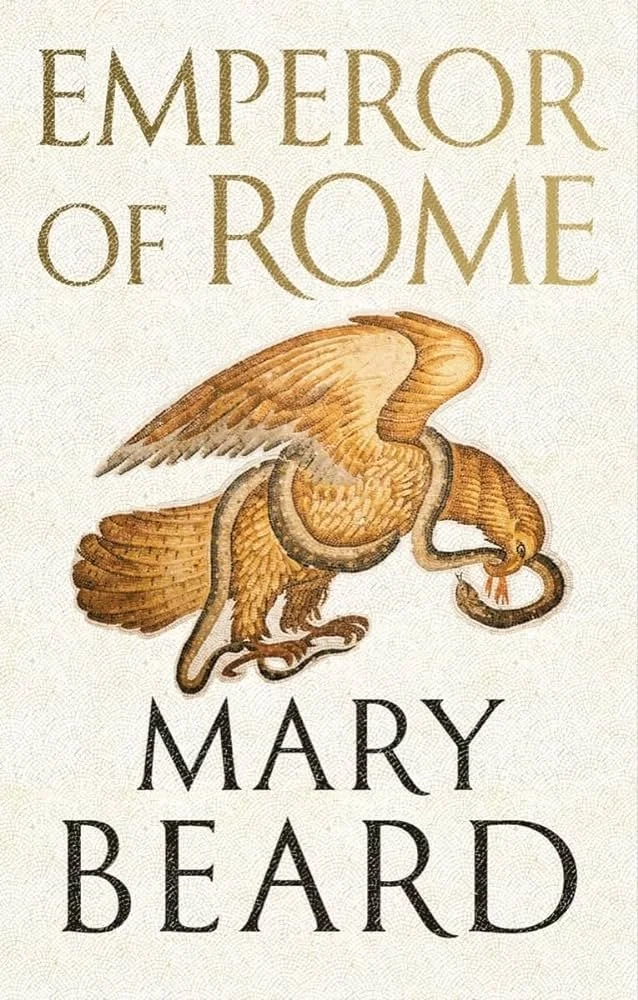Emperor of Rome by Mary Beard
/Emperor of Rome
By Mary Beard
Liveright 2023
What did the Roman emperors do all day? It’s the kind of question that’s been its own parody of historical inquiry for nearly a century, and like all parodies, it’s shot through with truth: the simple quotidian curiosity about the people of the past as human individuals is entirely natural, perhaps the foundation of all such inquiry.
Bestselling classicist Mary Beard has always known this in her books — almost certainly this is a big part of the reason for that ‘bestselling’ part — and it’s squarely at the center of her marvelous new release, Emperor of Rome. In this attractive 500-pound brick from the folks at Liveright, Beard walks through the Roman emperors from Julius Caesar to the end of the Severan dynasty, hitting all the marquee names like Augustus, Tiberius, Caligula, Nero, Hadrian, and Marcus Aurelius but also including not only all the also-fans but a smattering of the powerful women who helped rule the empire.
And with all of these people, she’s concerned this time around not so much with foreign wars and slave rebellions as she is with what the Roman emperors did all day: what did they eat, how did they spend their days, what were their actual duties (and how did they change over time), how did they live in their ever-expanding palace compound, who did they talk to, how did they make their decisions? It makes for consistently fascinating reading.
The central test case for this kind of examination is the remarkable correspondence between the emperor Trajan and Pliny the Younger when Pliny was governor of Pontus-Bithynia in what is now Turkey. Pliny peppered the long-suffering Trajan back in Rome with queries about all kinds of things, and when he later published the best of the results, he incalculably enriched posterity’s researchers by providing them with these letters. “Originally written on papyrus or scratched into wax tablets,” Beard writes, “they reveal not only some issues that might cross a Roman governor’s desk in this part of the empire — collapsing aqueducts, rules on burials, troublesome philosophers — but also the kind of information that reached the emperor himself.”
Beard is a familiar face on TV as an approachable popularizer of all things Ancient Rome, and maybe some of that experience has leached into her writing style (or maybe this book’s text is going to be a companion to some video production): she’s forever previewing what’s coming next in the book — “we will show that,” “we’ll soon see how,” “we’ll learn what, coming right up.” It’s a tic repeated so often throughout the book that you start to expect commercial breaks.
Sometimes, thankfully, the concentration on the future is entirely justified. Beard consistently makes the point that a large part of what the world tended to think about Emperor X could be determined by his successor, Emperor Y. “Whatever the conduct of these rulers during their lifetime, whether in the wheeling and dealing behind palace walls, in the tricky politics of the Roman elite, or in the treatment of the rest of the empire’s population, much of their posthumous reputation was always determined — and overdetermined — by their successors, and by the sometimes messy circumstances of the succession,” Beard writes. “The man who followed an emperor onto the throne, and by what means, was absolutely crucial in how his predecessor has been remembered and represented in the historical tradition over the centuries.”
Largely, though, Emperor of Rome is concerned with the everyday present: who were these people who exercised authority over a sprawling empire of millions of people? What kind of free time did they have, and how did they spend it? What can we reliably know about what kind of personalities they had? Fergus Millar asked many of these questions a few decades ago in his seminal The Emperor in the Roman World, and this warmly inquisitive new book by Beard provides a colorful, updated embellishment on the subject.
Steve Donoghue is a founding editor of Open Letters Monthly. His book criticism has appeared in The Washington Post, The American Conservative, The Spectator, The Wall Street Journal, The National, and the Daily Star. He writes regularly for The Boston Globe, the Vineyard Gazette, and the Christian Science Monitor and is the Books editor of Georgia’s Big Canoe News.
